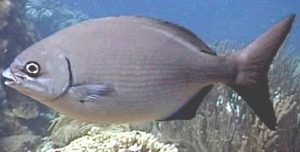
Burmuda Chub
Kyphosus sectatrix, commonly known as the Bermuda Chub or Bermuda Sea Chub, is a fish species belonging to the family Kyphosidae. Here are some interesting facts about Kyphosus sectatrix:
Appearance: The Bermuda Chub has an elongated, laterally compressed body with a slightly arched back, giving it a distinct profile. It has a deep, blunt head and a small mouth. The body coloration varies from silver-gray to bluish-gray, often with darker vertical bands or stripes along the sides.
Size: The Bermuda Chub can grow to an average length of about 12 to 16 inches (30 to 40 centimeters), although larger individuals have been recorded. The maximum reported size is around 24 inches (60 centimeters) in length.
Distribution: This species is endemic to the western Atlantic Ocean, specifically found in Bermuda and along the eastern coast of North America, ranging from North Carolina to Florida. It is primarily associated with Bermuda’s coastal waters.
Habitat: Bermuda Chubs are commonly found in nearshore and inshore environments, inhabiting reefs, rocky areas, seagrass beds, and shallow coastal waters. They prefer areas with high structural complexity and abundant hiding places.
Feeding Behavior: Bermuda Chubs are herbivorous and primarily feed on marine algae and seagrass. They use their specialized teeth to graze on the surfaces of rocks and vegetation, scraping off algae and other plant material.
Behavior: Bermuda Chubs are generally found in small groups or schools. They are diurnal, being most active during the day, and tend to stay close to their preferred habitats. They may display territorial behavior, defending their feeding territories from intruders.
Conservation Status: The conservation status of the Bermuda Chub is not specifically assessed by the International Union for Conservation of Nature (IUCN). However, it is believed to have stable populations within its limited range, and there are currently no known major threats impacting the species.
Importance in Ecosystems: Bermuda Chubs play a role in maintaining the health of reef and nearshore ecosystems. As herbivorous grazers, they help control algal growth and contribute to the overall balance of the marine environment.